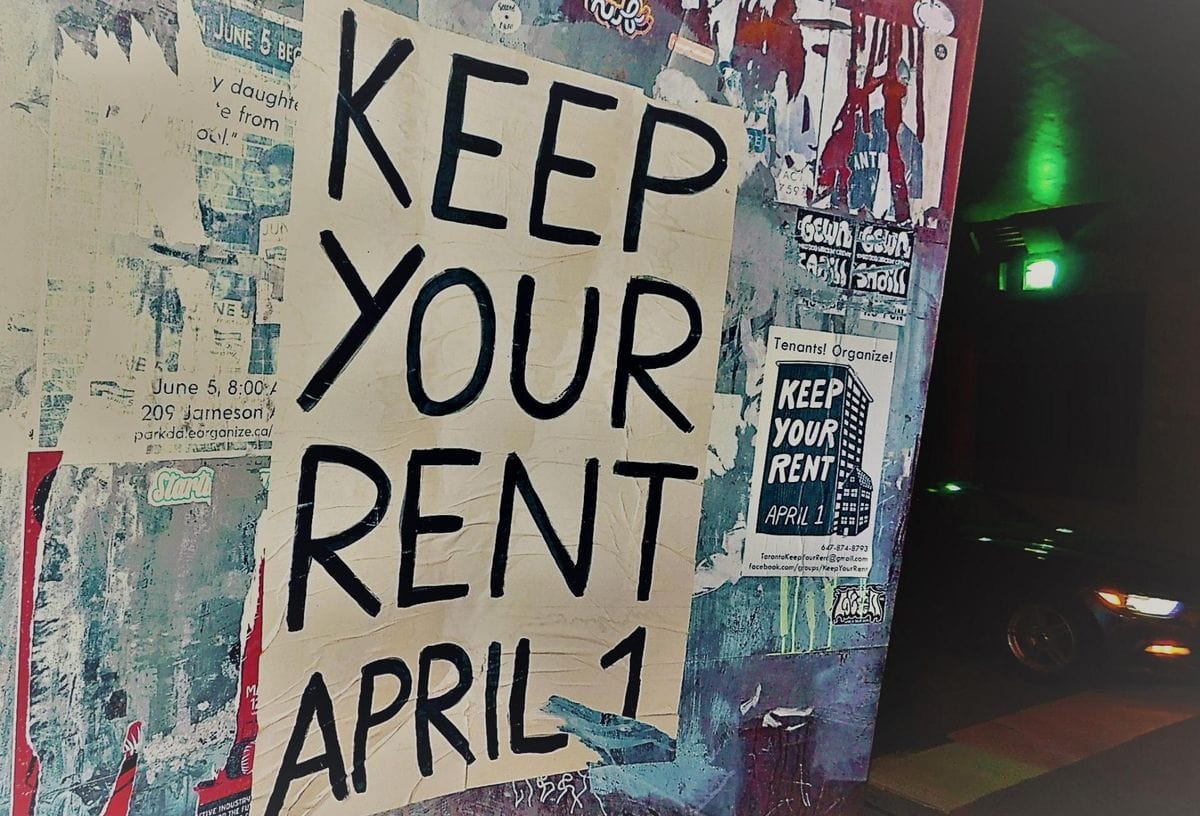
KJIPUKTUK (Halifax) – The COVID-19 pandemic has left many without income and therefore without the means to pay rent. As unemployment in the province rises, a rental payment due on April 1st could have disastrous consequences for many tenants in Nova Scotia.
Waiting for the provincial government to take appropriate action, local housing advocacy groups are promoting a city-wide rental strike starting this Wednesday. Online pledges are emerging, gathering the signatures of tenants across Halifax who are committed to withholding rental payments and preserving whatever financial resources they may still have.
Tenant organizing efforts are leaving local landlords concerned. “Unfortunately, we’re seeing a lot of people just coming in and saying we’re not going to pay our rent without negotiating,” Kevin Russell, Executive Director of the Investment Property Owners Association of Nova Scotia tells Halifax Today’s Victoria Walton. “…that’s a major concern for us and hopefully they don’t follow through on that.”
Some are less concerned about the financial well being of the landlord class. Even before the arrival of COVID-19 to Nova Scotia, the cost of rent in Halifax far exceeded the wages earned by many. While the cost of living requires at least a $19 per hour wage, the minimum wage is just $11.55. Demands from local organizations, like the Halifax Workers’ Action Centre and the Fight for $15 and Fairness campaign, to raise the minimum wage in accordance with the cost of living have largely been ignored.
What’s more, the government of Nova Scotia has failed to implement rent control protections. Landlords in Halifax have, therefore, been able to claim an increasing percentage of worker wages, leaving many struggling to sustain themselves.
“Why should landlords enjoy income security when those more vulnerable than them do not?” asks Asaf Rashid, lawyer and volunteer with the Halifax Workers’ Action Centre. “Excessive and increasing rental prices and a lack of affordable and available housing was a crisis before anyone breathed a word about COVID. They are urgent issues to address now because, in a few months, increased precariousness in the fallout will make matters worse.”
By the measure of the Canada Mortgage and Housing Corporation rent is only affordable if it costs less than 30% of the individual’s household income before tax. However, the average 1-bedroom apartment in Halifax costs $1,137.00 per month, which is almost 70% of a minimum wage worker’s gross monthly earnings. “One paycheque away from the abyss is the reality now facing so many,” says Rashid.
See also: News brief: Rent poor in Nova Scotia
The long-term impacts of excessively low-wages combined with high-rental costs cannot be ignored. A recent report by the Canadian Centre for Policy Alternatives shows that 46% of Canadian households have just one month’s worth of savings. A rental payment on April 1st could therefore exhaust whatever financial resources many households in Canada have left.
To properly self-isolate and slow the spread of the coronavirus without going bankrupt, some housing advocacy groups are encouraging people to withhold mortgage payments, utility bills, and taxes as well. “If we can’t work, we can’t pay,” is the tagline of a Facebook event being shared among Haligonians. Members are pledging to withhold bill payments until the government agrees to suspend all household costs.
Rent strikes are not legally protected, however organizing with fellow tenants may help insulate individuals from landlord retaliation. The more agree to participate, the more difficult it will be for a landlord to fight back. For individuals acting alone, the risk of eviction or financial penalty may be greater. Negotiating one-on-one with a landlord may be the safest option in this case.
In light of COVID-19, the provincial government has passed a temporary eviction-ban. However, the ban only protects those who have been directly affected by COVID-19, leaving many Nova Scotians still vulnerable to homelessness. Incidents of homelessness are not only dangerous to the individual but will also make containing the virus more difficult. Any eviction at this time is, therefore, a threat to public health and safety.
Further, the ban’s temporary nature means that COVID-19 related evictions will merely be delayed. This does nothing to solve the issue of housing insecurity, and still encourages unemployed tenants to pay rent, even if it comes at the expense of personal necessities like groceries.
To mitigate the financial impact of unemployment on Canadian workers, the federal government has taken measures to extend EI benefits. However, EI provides only 55% of an individual’s gross earnings. Minimum and low-wage earners working full-time in Halifax already struggle to pay rent. For some, EI will therefore fail to cover rental costs, let alone other basic needs.
For those who do not qualify for EI, the federal government has proposed legislation to establish the Canada Emergency Response Benefit (CERB). This would provide $2,000 a month (for up to four months) to those who have lost income due to the COVID-19 pandemic. However, the benefit barely exceeds monthly minimum wage earnings in Nova Scotia. For many tenants in Halifax, the cost of rent will therefore absorb the majority of the benefit.
The application process for CERB is set to start on April 6th, and applicants can expect a 10-day delay in receiving payment. “The emergency benefit is insufficient as it is and won’t start for weeks. Rent is due now,” says James Hutt of Courage Coalition; an organization advocating for mass rent strikes across the country.
Housing security is a growing concern, but protective measures are currently insufficient. Until the government suspends all housing costs, collective survival will come at the price of financial disobedience.
“At least hundreds of thousands, and likely millions of people in Canada will not be able to pay their rent as the COVID-19 crisis continues,” says Hutt. “Courage is calling for all renters to cancel rent payments in order to pressure governments to suspend rent for everyone, and protect the most vulnerable tenants from being evicted.”
See also: Lisa Cameron: Freeze rental payments and ban all evictions now
With a special thanks to our generous donors who make publication of the Nova Scotia Advocate possible.
Subscribe to the Nova Scotia Advocate weekly digest and never miss an article again. It’s free!



